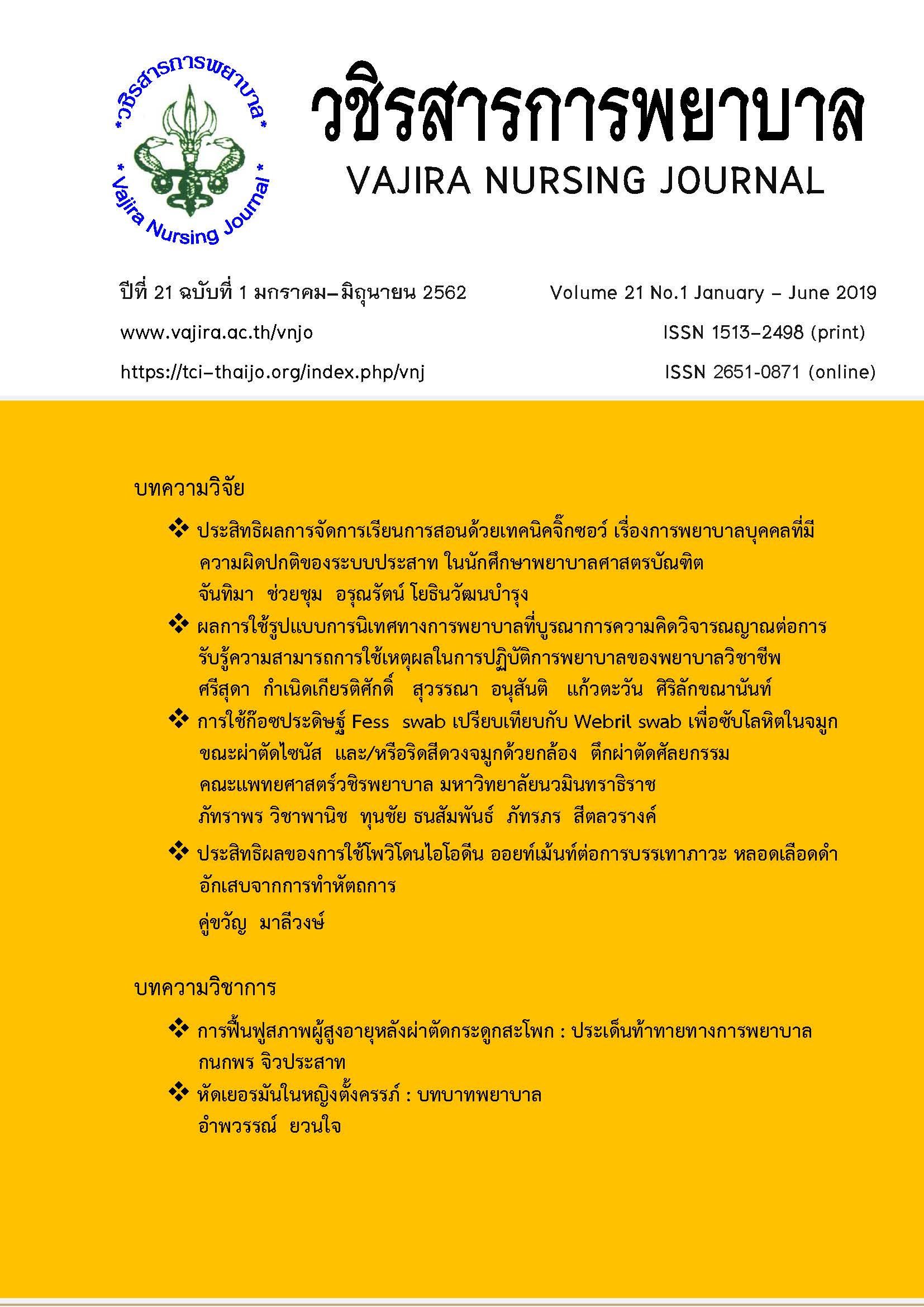หัดเยอรมันในหญิงตั้งครรภ์ : บทบาทพยาบาล
Main Article Content
บทคัดย่อ
โรคหัดเยอรมันในหญิงตั้งครรภ์ สามารถติดเชื้อไปยังทารกได้ตั้งแต่อยู่ในครรภ์ผ่านทางรก สารคัดหลั่ง เลือด และน้ำนมของมารดา ความรุนแรงของโรคอาจส่งผลให้ทารกพิการหรือเสียชีวิตในครรภ์ พยาบาลมีบทบาทสำคัญในการดูแลเรื่องโรคหัดเยอรมันในหญิงตั้งครรภ์ ตั้งแต่การป้องกันการติดเชื้อหัดเยอรมันในระยะก่อนตั้งครรภ์และระยะตั้งครรภ์ การคัดกรองโรคหัดเยอรมันระยะตั้งครรภ์ และการพยาบาลเมื่อหญิงตั้งครรภ์เป็นโรคหัดเยอรมัน รวมทั้งการป้องกันการแพร่กระจายของเชื้อหัดเยอรมันระยะคลอดและหลังคลอด
Article Details
เนื้อหาและข้อมูลในบทความที่ลงตีพิมพ์ในวชิรสารการพยาบาลถือเป็นข้อคิดเห็นและความรับผิดชอบของผู้เขียนบทความโดยตรง ซึ่งกองบรรณาธิการไม่จำเป็นต้องเห็นด้วย หรือร่วมรับผิดชอบใด ๆ ทั้งสิ้น
บทความ ข้อมูล เนื้อหา รูปภาพ ฯลฯ ที่ได้รับการตีพิมพ์ในวชิรสารการพยาบาล ถือเป็นลิขสิทธิ์ของวชิรสารการพยาบาล หากบุคคลใดหรือหน่วยงานใดต้องการนำทั้งหมดหรือส่วนหนึ่งส่วนใดไปเผยแพร่ต่อหรือเพื่อกระทำการใด ๆ จะต้องได้รับอนุญาตเป็นลายลักอักษรจากวชิรสารการพยาบาลก่อนเท่านั้น
เอกสารอ้างอิง
กนกกร สุนทรขจิต (2559, สิงหาคม). การติดเชื้อหัดเยอรมันในหญิงตั้งครรภ์. วงการแพทย์. สืบค้นจาก http://www.wongkarnpat.com/upfilecme/CME%20460.pdf
กองโรคป้องกันด้วยวัคซีน กรมควบคุมโรค กระทรวงสาธารณสุข. (2561). มาตรฐานการดำเนินงานสร้างเสริมภูมิคุ้มกันโรค ปี 2561. สืบค้นจาก http://dvpd.ddc.moph.go.th/storage/content/file%20standard/1528956173-0085.pdf
สุรเกียรติ อาชานุภาพ. (2553). หัดเยอรมัน. หนังสือตำราการตรวจรักษาโรคทั่วไป 2 (พิมพ์ครั้งที่ 3). กรุงเทพฯ: อุษาการพิมพ์.
สํานักระบาดวิทยา กรมควบคุมโรค กระทรวงสาธารณสุข. (2560). ระบบรายงานการเฝ้าระวังโรค ๕๐๖ rubella. สืบค้นจาก http://www.boe.moph.go.th/boedb/surdata/506wk/y60/d16_5360.pdf
ศรุตยา รองเลื่อน ภัทรวลัย ตลึงจิตร และสมประสงค์ ศิริบริรักษ์. (2555). การตั้งครรภ์ไม่พึงประสงค์: การสำรวจปัญหาและความต้องการการสนับสนุนในการรักษาพยาบาล. วารสาร พยาบาลศิริราช. 14- 28.
American Academy of Pediatrics. (2015). Red book: 2015 Report of the Committee on infectious Diseases (30th eds), Elk Grove Village: American Academy of Pediatrics.
Banatvala, J.E. & Brown, D.W. (2004). Rubella. Lancet, 363, 1127-1137.
Banerji, A., Ford-Jones, E. L., Kelly, E., & Robinson, J. L. (2005). Congenital rubella syndrome despite maternal antibodies. Canadian Medical Association journal, 172(13), 1678–1679. doi:10.1503/cmaj.050230
Centers for Disease Control and Prevention. (2001, July 13. Control and prevention of rubella: evaluation and management of suspected outbreaks, rubella in pregnant women, and surveillance for congenital rubella syndrome. MMWR Recomm Rep, 50(RR12), 1–23. Retrived from https://www.cdc.gov/mmwr/preview/mmwrhtml/rr5012a1.htm
Dontigny, L., Arsenault, M.Y., Martel, M.J. & Clinical Practice Obstetrics Committee. (2008). Rubella in pregnancy. J Obstet Gynaecol Can, 30(2), 152-158.
Edlich, R.F., Winters, K.L., Long, W.B. & Gubler, K.D. (2005). Rubella and congenital rubella (German measles). J Long Term Eff Med Implants, 15(3), 319–328.
Macé, M., Cointe, D., Six, C., Levy-Bruhl, D., ChÂtelet, I.P., Ingrand, D. & Grangeot-Keros, L. (2004). Diagnostic Value of Reverse Transcription-PCR of Amniotic Fluid for Prenatal Diagnosis of Congenital Rubella Infection in Pregnant Women with Confirmed Primary Rubella Infection. Journal of Clinical Microbiology, 42(10), 4818-4820.
McLean, H.Q., Fiebelkorn, A.P., Temte, J.L., Wallace, G.S. & Centers for Disease Control and Prevention. (2013). Prevention of measles, rubella, congenital rubella syndrome, and mumps, 2013: summary recommendations of the Advisory Committee on Immunization Practices (ACIP). MMWR Recomm Rep, 62(RR-04), 1-34.
Oster, M.E., Riehle-Colarusso, T. & Correa, A. (2010). An update on cardiovascular malformations in congenital rubella syndrome. Birth Defects Res A Clin Mol Teratol, 88(1), 1-8.
Plotkin, S.A., Reef, S.E., Cooper, L.Z. & Alford, C.A. (2011). Rubella In: J.S. Remington, J.O. Klein, C.B. Wilson & et al. (Eds), Infectious Diseases of the Fetus and Newborn Infant. (7th ed). Philadelphia: Elsevier Saunders.
World Health Organization. (2018). Global Measles and Rubella Update August 2018. Retrieved from.https://www.who.int/immunization/monitoring_surveillance/burden/vpd/surveillance_type/active/Global_MR_Update_August_2018.pdf


